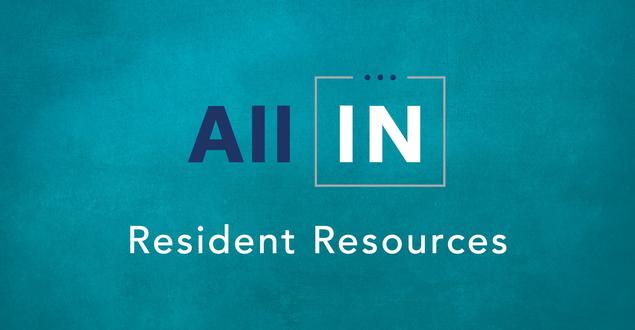
COVID-19 has impacted nearly every aspect of the local and global economy. This page was compiled of internal and external sources to provide insight about the pandemic as well as its impact on capital markets, rent collection, construction and architecture, operations, public policy, among other impacts.
Operations and Resident Support
Our campaign to engage both residents and our staff in fighting COVID-19 continues. Entitled ALL IN, the campaign has focused on helping residents access resources and stay safe, informed and connected. It is also geared at celebrating the great work of our staff in doing this. Here are some current examples:
ALL IN Hero of the Week | Employee/Resident Testimonials | Dominium Dose of ALL IN | Resident Resources
Rent Collections
As we head into June, we are tracking early payments. Here is today’s report, which adds July 2019 as another reference point as it was the most recent month in which the 1st fell on a Monday:
As of May 26th (6 days before June 1) we have collected 4.5% of resident receipts.
- This is flat to May early receipts.
- It is 0.1% up from April early receipts.
- It is significantly ahead of July 2019, which was 3.3% by the 26th.

Housing News
Bloomberg states that the ban on evictions is hurting landlords, who owe lenders more than $1 trillion combined. Nearly half of all 43 million rental units in the US are owned by small businesses, not collecting on rent will cause a ripple effect as “both renters and property owners will slide down the socioeconomic scale together.”
Multifamily construction declined by 25% between March and April due to COVID-19, according to Dodge Data & Analytics. Compared to the first four months of the year in 2019, total construction starts were 8% lower in 2020.
Freddie Mac TEL had a select sponsor update call last week with the Head of Multifamily and the Senior Vice President Production and Sales to discuss market observations, pipeline and political updates, as well as the status of Freddie during the pandemic. Freddie is cautiously optimistic and is starting to hit a “more normal” phase. See notes taken by Mark Lambing.
The OCC has released a new rule to modernize the Community Reinvestment Act, which will apply only to national banks and thrifts, as the FDIC declined to support it.
The Visual Capitalist has put together occupational risk scores of numerous different occupations. Using attributes from the US Department of Labor, they determine that social distancing is a luxury available to 29% of Americans with a majority of at risk making less than $50,000 a year.
NAHB signed a letter to congressional leaders urging support for affordable housing as a part of the A Call To Invest In Our Neighborhoods (ACTION) Coalition. COVID-19 has only added to the shortage of affordable rental housing in the US. In the next relief package, the coalition is requesting the enactment of a minimum 4% housing credit rate and “[lowering] the “50% test” bond financing threshold for 4% Housing Credit developments.”
CBRE’s Market Watch includes 5 articles relating to affordable housing that CBRE found interesting. Topics include legislation, cleaning properties of potential COVID infection, and “waiting out” multifamily opportunities in the aftermath.
Identifying the need for more affordable housing due to the pandemic, KeyBank launched a LIHTC equity initiative “to provide a robust one-stop solution for clients and investors nationally: providing tax credit equity, construction and permanent financing, including Freddie, Fannie or HUD executions,” according to Stacie Nekus, the team leader for the Equity Growth Initiative and Investor Relations.
Pandemic News
Dr. Michael Osterholm discusses smart testing, effects of COVID-19 on children, and risk of transmission outside in this week’s episode of the Osterholm Update: COVID-19.
CIDRAP has put out a report on Smart Testing for COVID-19. The infographic below shows their keys for success in testing for COVID.

Early trials of Moderna’s highly anticipated human coronavirus vaccine is showing promise with some participants producing antibodies.
The CDC Response Team published an article reporting findings based on data from China, Italy, and the US. They found that individuals with underlying health conditions, such as cardiovascular disease, diabetes, chronic lung disease, are at higher risk for severe cases of COVID-19 than those without such health conditions.
The CDC’s tracker of confirmed cases of and deaths from COVID-19 across the US provides the most up to date information on the spread of the virus.
IHME’s COVID-19 Projections page shows trends and projections of deaths and hospital resource usage. The graph below shows their projection for daily infections and testing:

Erin Bromage, a Comparative Immunologist and Professor of Biology at the University of Massachusetts Dartmouth, wrote a blog post titled, The Risks – Know Them – Avoid Them, which breaks down information about coronavirus from how much is released in the environment, where people are getting sick, and the role of asymptomatic people in the virus’ spread.
Based on a study by Columbia University on other coronaviruses, immunity does not always last. However, it is unknown whether COVID-19 will follow this trend. This study explores other coronaviruses and compares them to what is known about COVID-19.
Economic & Employment News
Tech company, Thomas, surveyed one thousand manufacturers in North American and are reporting that nearly two-thirds are thinking of returning sourcing and production to the continent, or “reshoring”, due to the pandemic.
In normal recessions, banks will make cuts to save costs. However, Reuters reports that US banks are spending more and do not plan to alter budgets or staff levels. Many are focusing on taking care of their employees during this time.
Reuters explores the effects of nearly $3 trillion over the last two months on the US economy during the pandemic. Returning to normal life will take “more time, effort and money” than originally thought with no clear end in sight.
This paper by University of Chicago economists estimates that 42% of recent layoffs will result in permanent job losses. It also posits that recovery will be slower due to a failure to quickly reallocate resources to the most productive activities post-COVID-19 shock. This will perhaps be exacerbated by policy issues such as subsidizing employee retention, unemployment benefits exceeding worker earnings, occupational licensing restrictions, and regulatory barriers to business formation.
Other Interesting & Helpful Resources
Energy News Network greenhouse gas emissions in Minneapolis have decreased by 59%, due in part to the trend of building newer housing. A study by the American Council for an Energy-Efficient Economy compared dozens of municipalities but focused on the results in Minneapolis, Los Angeles, and Washington D.C.
Universal Orlando Resort opens nine retail and entertainment venues in its CityWalk retail district this week, providing a key test for resort properties trying to reopen since the pandemic. Florida State guidelines limit indoor occupancy to just 25% capacity in dining establishments. All customers and workers must wear masks, and temperature checks are required for entry into the retail district.
State-by-State Actions
- Schools: Education Week
- Reopening Status: The New York Times
- Construction Limits: Architect Magazine

Resident Resources
Freddie Mac offers a Renter Helpline, which provides counseling for renters on budgeting, credit improvement and debt management. The attached flyer is available in multiple languages.
HUD provides this guide and FAQ for Renters during the pandemic.
IRS Information on COVID-19 Checks
Dominium Resident Resources by property
Information on filing for unemployment

Communications
We hope that our friends and partners in affordable housing find this information helpful and will send information our way as well. A collection of previous updates can be found below.
Impact Updates
#1 - April 1, 2020 | #2 - April 2, 2020 | #3 - April 3, 2020 | #4 - April 4, 2020 | #5 - April 6, 2020
#6 - April 7, 2020 | #7 - April 8, 2020 | #8 - April 9, 2020 | #9 - April 10, 2020 | #10 - April 14, 2020
#11 - April 21, 2020 | #12 - April 28, 2020 | #13 - May 5, 2020 | #14 - May 8, 2020 | #15 - May 13, 2020
#16 - May 15, 2020 | #17 - May 19, 2020 | #18 - May 22, 2020 | #19 - May 26, 2020 | #20 - May 29, 2020
![]()
